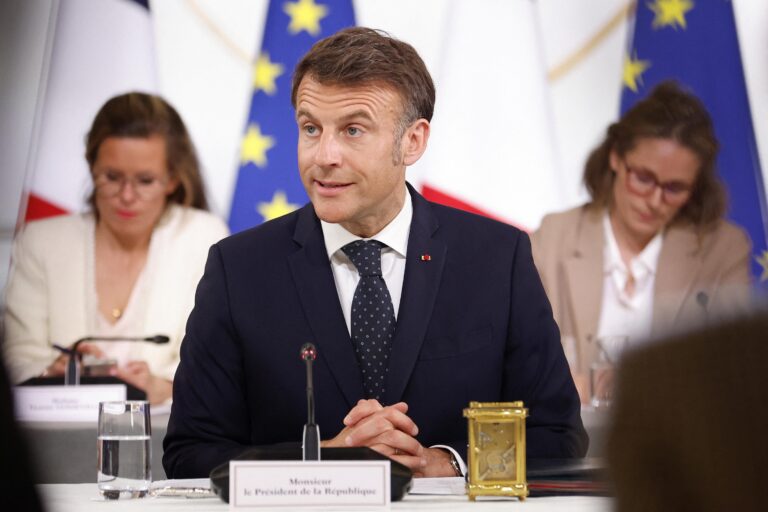French President Emmanuel Macron has called for a suspension of new French investments in the United States following the imposition of American tariffs on European goods. Macron’s statement comes amid escalating trade tensions between the two economic powers, with Paris signaling a firm response to protect its industries. The announcement marks a significant development in the ongoing dispute over tariffs, which has raised concerns about the potential impact on transatlantic economic relations.
France’s Macron Urges Halt to US Investments Following Tariff Dispute
French President Emmanuel Macron has called on French companies to pause new investments in the United States amid escalating tensions over recently imposed tariffs. The move reflects growing frustration in Paris, where officials argue that the US trade measures unfairly target European industries and disrupt transatlantic economic relations. Macron’s appeal signals a potential shift in bilateral cooperation as both sides reassess strategies amid rising protectionism.
Industry leaders and policymakers are closely monitoring the impact of these tariffs on key sectors. Macron emphasized that any continued financial commitment to US markets should be reconsidered until a “fair and reciprocal” trade environment is restored. Below is a quick summary of sectors most affected:
| Sector | Impact | French Exports at Risk |
|---|---|---|
| Automotive | High tariffs on European cars | €12 billion |
| Agriculture | Increased duties on wines and cheeses | €5 billion |
| Aerospace | Potential retaliation threats | €8 billion |
- Macron urges strategic caution among French investors
- Calls for dialogue to resolve trade disputes amicably
- EU-wide repercussions anticipated if issues remain unresolved
Analyzing the Economic Impact of US Tariffs on Franco-American Trade
The recent U.S. tariffs have injected significant uncertainty into the Franco-American trade relationship, disrupting established supply chains and threatening economic growth on both sides of the Atlantic. With France’s President Macron urging a pause on new investments in the U.S., the move highlights broader concerns over escalating protectionism and its tangible consequences for multinational businesses. Key industries likely to feel the impact include aerospace, automotive, and luxury goods, where cross-border cooperation is deeply embedded.
Economic repercussions expected:
- Reduction in French direct investment flows into the U.S.
- Potential job losses in export-dependent sectors
- Increased production costs due to tariff-induced price rises
- Heightened market volatility affecting investor confidence
| Sector | Estimated Tariff Impact | Investment Outlook |
|---|---|---|
| Aerospace | +10% costs | Suspended projects |
| Automotive | +15% costs | Decreased expansion |
| Luxury Goods | +8% export taxes | Shift to alternative markets |
Macron Calls for Strategic Review of Bilateral Investment Policies
French President Emmanuel Macron has urged for a comprehensive reassessment of France’s investment approach in the United States following the imposition of recent tariffs. Highlighting the need for a strategic pause, Macron emphasized that these trade barriers signal a shift requiring France to reconsider its engagement and reassess risks linked to bilateral economic ties. This call reflects mounting concerns over protectionism and the impact of unpredictable trade policies on long-term investment stability.
Macron’s proposal includes a series of measures aimed at safeguarding French economic interests, such as:
- Temporary suspension of new investments in the US market
- Enhanced monitoring of tariff developments
- Strengthening of domestic industrial capabilities
- Promotion of multilateral dialogue to resolve trade disputes
To contextualize these ramifications, the following table summarizes the recent tariff changes and potential impacts:
| Product Category | Tariff Increase (%) | Expected Impact |
|---|---|---|
| Automobiles | 15 | Higher costs, reduced exports |
| Steel and Aluminum | 25 | Supply chain disruptions |
| Agricultural Goods | 10 | Competitive disadvantage |
Recommendations for Strengthening European Economic Autonomy Amid US Tensions
In response to escalating trade tensions, it is imperative for Europe to recalibrate its approach to economic sovereignty with a clear emphasis on resilience and diversification. Key recommendations include:
- Boosting intra-European investments: Prioritize capital flows within the EU to stimulate homegrown industries and reduce external dependencies.
- Enhancing technological independence: Invest significantly in emerging fields such as artificial intelligence, green technologies, and semiconductors to lessen reliance on foreign supply chains.
- Fortifying strategic supply chains: Develop secure and diversified sources for critical raw materials and intermediate goods.
- Implementing coordinated trade policies: Establish EU-wide mechanisms to react uniformly to external economic pressures while protecting domestic interests.
To visualize the strategic focus areas, the table below illustrates a simplified prioritization framework for the EU’s economic autonomy initiatives:
| Focus Area | Investment Priority | Expected Impact |
|---|---|---|
| Intra-EU Investment | High | Economic Stability |
| Technological Innovation | Very High | Global Competitiveness |
| Supply Chain Security | Medium | Trade Resilience |
| Trade Policy Coordination | High | Geopolitical Leverage |
Concluding Remarks
As tensions between France and the United States escalate over recent tariff measures, President Emmanuel Macron’s call to suspend French investment in the US signals a significant diplomatic and economic rift. The development underscores the growing challenges in transatlantic trade relations amid protectionist policies. Observers will be watching closely to see how both sides navigate this unfolding dispute and whether dialogue can restore cooperation and mutual economic benefit.




